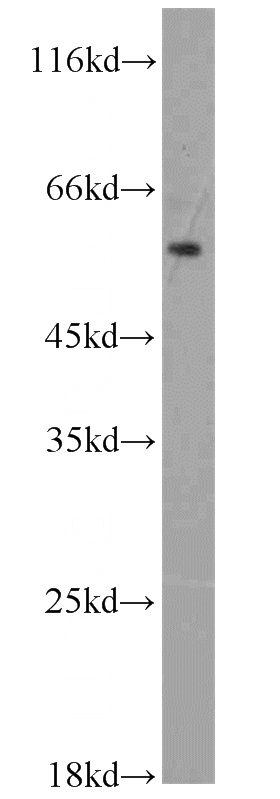-
Product Name
ADAM2 antibody
- Documents
-
Description
ADAM2 Rabbit Polyclonal antibody. Positive WB detected in mouse testis tissue, human testis tissue. Observed molecular weight by Western-blot: 50-55 kDa, 65-75 kDa
-
Tested applications
ELISA, WB
-
Species reactivity
Human, Mouse; other species not tested.
-
Alternative names
ADAM 2 antibody; ADAM metallopeptidase domain 2 antibody; ADAM2 antibody; Cancer/testis antigen 15 antibody; CRYN1 antibody; CRYN2 antibody; CT15 antibody; Fertilin subunit beta antibody; FTNB antibody; PH 30 antibody; PH 30b antibody; PH30 antibody; PH30 beta antibody
-
Isotype
Rabbit IgG
-
Preparation
This antibody was obtained by immunization of ADAM2 recombinant protein (Accession Number: NM_001278113). Purification method: Antigen affinity purified.
-
Clonality
Polyclonal
-
Formulation
PBS with 0.1% sodium azide and 50% glycerol pH 7.3.
-
Storage instructions
Store at -20℃. DO NOT ALIQUOT
-
Applications
Recommended Dilution:
WB: 1:500-1:5000
-
Validations

mouse testis tissue were subjected to SDS PAGE followed by western blot with Catalog No:107765(ADAM2 antibody) at dilution of 1:1000
-
Background
Members of the ADAM (a disintegrin and metalloprotease) family are multifunctional, transmembranous proteins consisting of pro-, metalloprotease, disintegrin, cysteine-rich, epidermal growth factor-like, transmembrane, and cytoplasmic tail domains. Fertilin, a heterodimeric protein complex composed of a(ADAM1) and b(ADAM2) subunits present on the sperm surface, has been believed to mediate adhesion and fusion between the sperm and egg plasma membranes. ADAM2-deficient mouse sperm is also defective in adhesion to and fusion with the egg membrane (PMID:16407235). It has 2 isoforms produced by alternative splicing and 5 glycosylation sites.
Related Products / Services
Please note: All products are "FOR RESEARCH USE ONLY AND ARE NOT INTENDED FOR DIAGNOSTIC OR THERAPEUTIC USE"
